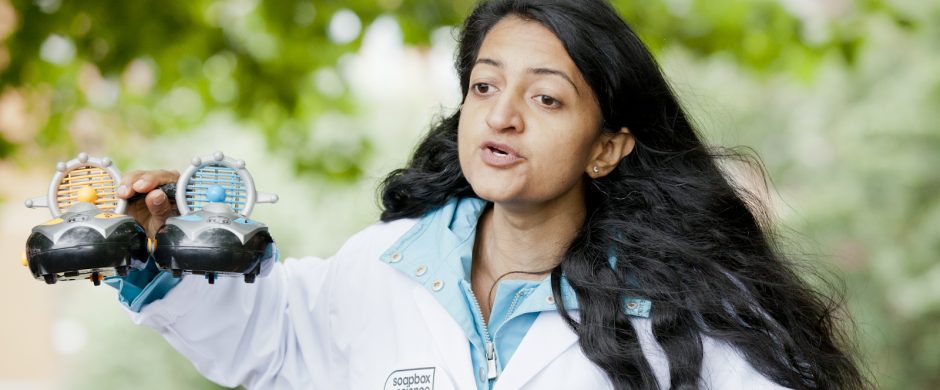 Charlotte studied for a Masters in Physics and Astronomy at The University of Sheffield, graduating in 2013 before getting a PhD in Astrophysics at the University of Warwick. This involved using Hubble Space Telescope images to study the galaxies of extremely energetic supernovae (superluminous supernovae). Charlotte began working with the Supernova Group at the University of Southampton in early 2017, where she now uses data from Dark Energy Survey to study these superluminous supernovae. We are grateful to the South-East Physics Network for supporting Charlotte, who will be at Soapbox Science Brighton on 2nd June 11am-2pm with her talk “How many ways can you make a star explode?”
Charlotte studied for a Masters in Physics and Astronomy at The University of Sheffield, graduating in 2013 before getting a PhD in Astrophysics at the University of Warwick. This involved using Hubble Space Telescope images to study the galaxies of extremely energetic supernovae (superluminous supernovae). Charlotte began working with the Supernova Group at the University of Southampton in early 2017, where she now uses data from Dark Energy Survey to study these superluminous supernovae. We are grateful to the South-East Physics Network for supporting Charlotte, who will be at Soapbox Science Brighton on 2nd June 11am-2pm with her talk “How many ways can you make a star explode?”
SS: What attracted you to Soapbox Science in the first place – and what are you most looking forward to/excited about in taking part?
CA: I love outreach, and as I work in astrophysics, I’m used to having lots of “pretty pictures” on slides behind me when I talk to people about my research. Soapbox science presents a great opportunity for me to engage with people about my research in a very different way – no slides, no photographs, just me and a few props! I want to see if I can get people really excited about the physics behind the pretty pictures!
SS: What, or who, inspired you to get a career in science?
CA: Honestly…I sort of stumbled into a career in science. Until I was 16 I wanted to be a writer!
I suppose I’m mostly where I am today because of my Dad. He always encouraged me to do what I enjoy, and I’ve always loved problem solving, (he would always sit and work through maths and physics problems with me when I was at school because he enjoyed it too!). Now I’m problem solving every day during my research!
SS: What is the most fascinating aspect of your research/work?
CA: Definitely the locations I get to go to! My work enables me to visit observatories around the world, from Chile to the Canary Islands, so that I can take data for my research. These observatories are some of the darkest sites on the planet – with no light pollution from nearby cities, so the night sky is beautiful to look at!
SS: Research in STEM is increasingly multi-disciplinary. Which subjects do you use in your work?
CA: My research relies upon on optics and engineering. I use data from the Dark Energy Survey, a large astronomical survey which uses “red sensitive” CCD chips. These CCD chips have been designed so that they can detect more light from redder wavelengths during an exposure. This is very import for my research, as I study events in the very distant Universe, whose light appears redder to us.
SS: What 3 attributes do you consider important to your work (e.g. creativity, team-work, etc), and why did you pick these?
CA: 1) Patience – I’m not kidding! When you’re observing, sometimes the weather just won’t play ball! Sitting on a mountain waiting for clouds to move or the wind speed to drop can be very challenging (not to mention tiring), but it’s always rewarding when it does.
2) Lateral thinking. I very often hit barriers in my work because of problems with data quality…or sometimes its availability! So I always have to think about other ways of obtaining the results I want (e.g. changing the way in which I do my analysis)
3) Communication skills. Telescope time is expensive and difficult to get, so when applying for observing time you need to be able to express what your science goals are and why these observations would be important.
SS: If you could change one thing about the scientific culture right now, what would it be?
CA: Just one thing? There are too many! But if I had to chose one, I’d start with the expectation that “publishing often = successful scientist”. Sometimes there’s a real rush in academia to publish results as fast as you can, just to get ahead of the competition, or to add additional weight to your name before applying for jobs/observations/grants etc. This is definitely not how academia should be. We should be collaborating with our competitors, and aiming to produce the best results possible, rather than rushing them out for citations.
SS: What would be your top recommendation to a female student considering pursuing a career in academia?
CA: If anyone ever says or does something that you’re uncomfortable with, do something about it, don’t ignore it. Academia should be an environment in which everyone feels equal, comfortable and welcome, and nobody should be made to feel otherwise!
SS: What words of encouragement would you give to children who might be interested in a career in science?
CA: Never be afraid to question anything! It’s true what they say – there are no stupid questions! That’s what makes a great scientist.
